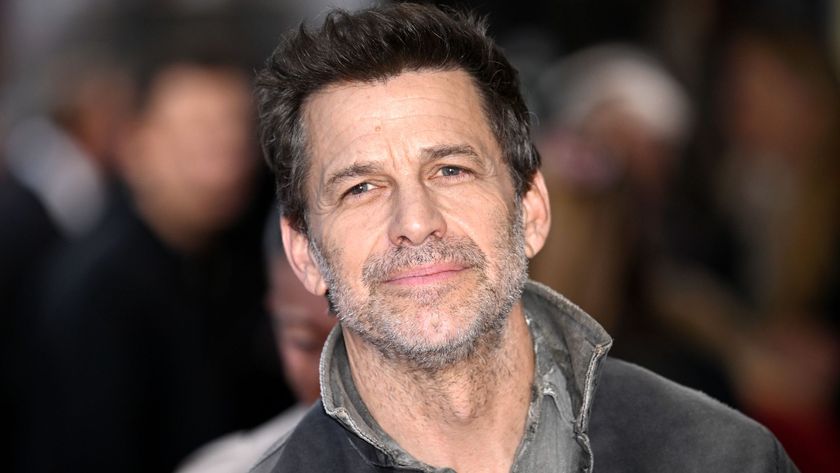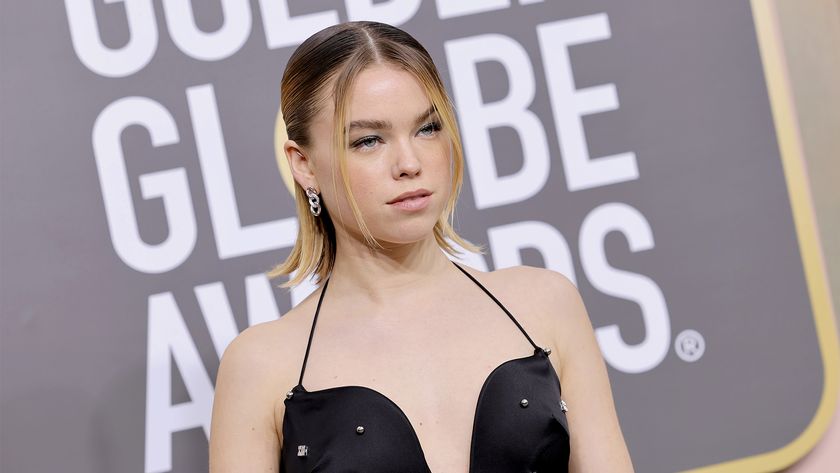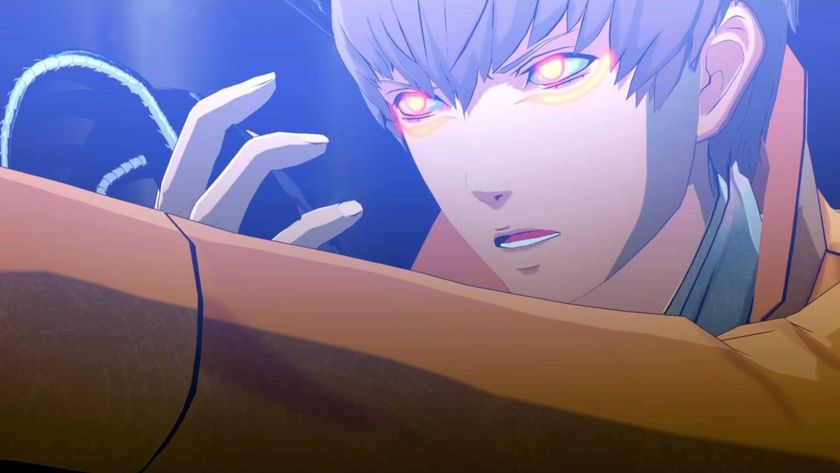Agent Provocateur
The all-American wunderkind with a leftfield agenda, Matt Damon swaps sensitivity for spy games in surprise US hit The Bourne Identity.
Matt Damon is standing on an armchair, laughing gleefully, taking the piss out of Michael Bay. “He has that low-angle shot he loves to use,” he says, trashing the upholstery of an upmarket London hotel, “where he goes slo-mo in one direction and the actor turns in the opposite direction. It’s in every one of his movies. It’s in the fucking Rock, it’s in Armageddon, so you end up seeing this...” Cue Damon re-enacting a classic Bayism, with Total Film looking up for a camera’s-eye view of the actor striking a “heroic” pose, for just as long as he can keep a straight face. Which is about three seconds.
Bay, it’s fair to say, won’t be joining Steven Spielberg, Francis Ford Coppola and Kevin Smith on Damon’s list of collaborators. Particularly given the experience of his long-time best friend, Ben Affleck, on Pearl Harbor. “Ben kind of jumped off a cliff doing that,” says Damon. “As did the other actors. They were told: ‘This event is the loss of innocence for your country, so you really have to invest it with this wide-eyed hopefulness.’ Yet I felt the movie ended up being edited, by Bay, with some kind of MTV, year 2000 cynicism, which undercut the performances. What ends up happening is you get these people saying these saccharine things, you get a violin swell and it ends up looking like the actors aren’t pulling their weight. They got abandoned.”
Evidently, Matt Damon speaks his mind. There’s no publicist-aided, celeb bullshit here. In a conversation laced with wit and profanity, what’s shocking is his frankness – perhaps a by-product of his unconventional upbringing. Damon’s parents split when he was two and he was raised in a six-family commune with his mother, a professor of child development (her antipathy for conventional toys meant Damon’s play relied heavily on his imagination), and his older brother Kyle, now an artist. He had to learn to stand up for himself. The result: a bone fide movie star, but one with an intriguing, indie sensibility.
How many other actors, in a position to cement their A-list status, would choose to play a murderous gay conman, as Damon did with The Talented Mr Ripley? Or follow up the grubby card grifting of Rounders by playing a foul-mouthed, gun-toting angel, as he did in Dogma? Sure, there’s little defence for the mystical golf caddy crap of The Legend Of Bagger Vance (“I never thought the script was great,
I just wanted to work with Redford”) but he followed it up with Billy Bob Thornton’s ambitious Western, All The Pretty Horses – which got “cut to ribbons” by Miramax in what the actor describes as a “deeply painful” experience. What next? Ocean’s Eleven. Coolest movie of the decade so far, hands down. “Soderbergh’s pretty incredible,” Damon enthuses, sparking up one of the many Marlboro Lights he’ll smoke during our first meeting. “We all felt lucky to be there. There was no place that any of us would rather have been at that point in our lives. Would I do a sequel? In a second.”
So, with Vance and Horses face-falling flops, what’s his latest headlining gig? A fail-safe blockbuster? A mainstream crowdpleaser sure to spring him back up the Hollywood power list? You can see where we’re going with the rhetoric... Damon’s new movie pairs him with Doug Liman, the indie-king New Yorker behind Swingers and Go, on the director’s first big-budget studio movie. Hardly a safe choice to adapt Robert Ludlum’s bazillion-selling espionage novel, The Bourne Identity, but that’s the point...
“I wouldn’t have made this movie with the directors who normally make this kind of movie,” grins Damon, looking every inch the American everyman in T-shirt and jeans. “I think that it might have been ordinary, but Doug thinks out of the box, he’s more independent minded.”
Sign up for the Total Film Newsletter
Bringing all the latest movie news, features, and reviews to your inbox
Liman’s independent mind made The Bourne Identity a tough shoot. Filmed on location in France, the Czech Republic and Italy, with no fixed script, it was a combative production, as Liman constantly battled the studio (their arguments eventually lead to reshoots and an $8 million budget overspill). And while Bourne’s decidedly unconventional for a spy thriller, coming on like a Bond movie shot by Jean-Pierre Melville, it still contains the requisite amount of action, and took a lot of hard work from its star to play the eponymous, amnesiac assassin.
“I trained hard for it. I took boxing for six months and then martial arts and firearm training. The fight scene in that apartment...” he says, referring to a particularly painful highlight. “That’s a lot of Kali, which is this Filipino martial arts style. After a session with one of these Kali guys you can’t lift your arms because they’ve destroyed them. We rehearsed for six weeks to do that fight and that guy I’m fighting is an actual French kickboxer.”
So did he take a battering? “No, because the guy, Nicky Naude, was so good he never hit me. Well, he hit me once, with an elbow, in the face. I had a deal with him. I said: ‘Look, man, I’m going to punch you in the face. I know I am, I’m just not as good at this as you are. I’ll tell you what, every time I hit you I’ll buy you a bottle of champagne.’ At the end of the day I owed the guy like two cases of champagne.”
The Bourne Identity isn’t the first movie Damon’s gone through the mill for. When you think Method, you think DeNiro, you think Day-Lewis, you do not think Damon. But his dedication is total. He spent months learning the piano to play Ripley and broke a rib learning golf for Vance (“I feel like a total loser for that”), but by far his most gruelling experience came preparing to play a heroin-addicted soldier in Courage Under Fire, for which he lost 40 pounds and, in the process, seriously damaged his health. “That came from not having a nutritionist. I said: ‘Listen, I’m going to lose all this weight,’ and they went: ‘All right buddy, whatever.’ I said: ‘Can I have a nutritionist?’ and they went: ‘What are you, fucking out of your mind? We’re not paying for a nutritionist, you little punk, you’re lucky you got the job!’
“So I did it on my own. This thing was a crash diet. And I was running 13 miles a day. For four months I woke up and ran six and a half miles morning and night and ate only chicken and egg whites and one potato a day. I wanted the work. It’s a hard life, living out there and not working. It’s frustrating. But that’s how we wrote the movie. We had all this creative energy and nowhere to put it and eventually we just decided to make our own thing.”
“We”, of course, is Damon and Affleck. Matt ’n’ Ben. “The movie” is Good Will Hunting, for which the pair won the Best Original Screenplay gong in 1998. When they climbed the podium to receive their Golden Baldies, even the most hardened cynics were engaged by their sheer joy. It was the seal of success on a friendship that has proved more durable than either parties’ sexual liaisons (Damon’s exes include Winona Ryder and Minnie Driver, who, no, he did not dump on Oprah. “That’s not true and I don’t know how that rumour got started”).
They met in Cambridge, Massachusetts, Damon aged 10, Affleck eight. In their teens, Affleck got Damon an agent and years later, when their careers were in the mid-’90s doldrums, encouraged him to develop a story he first scribbled in a creative writing class while at Harvard (his English degree remains uncompleted). Eventually, hard work and moviebiz savvy paid off. “It was all based on what happened with Reservoir Dogs,” recalls Damon. “Their money came from Harvey Keitel’s involvement. We referred to the Robin Williams character as the Keitel part. We said: ‘Right, we gotta write this character so we can get our Keitel. We need that role to get our money, because our names aren’t worth anything.’”
Williams went on to win an Oscar for his portrayal of wounded therapist Sean Maguire in the Gus Van Sant-directed movie, while Damon’s nominated turn as working-class maths genius Will Hunting, and Affleck’s performance as his straight-talking best friend, would make the young actors major stars. The only blackspot was the bitching that surrounded their screenplay Oscar win, with rumours that William Goldman had actually written the script. “That was a lesson in the politics behind the Oscars. That sniping came the week the ballots were due,” says Damon. “And then, the second the ballots went in, it was cleared up. They went: ‘Oh no, no, no, sorry.’ Everyone was on the record. William Goldman said: ‘I don’t know what the fuck you’re talking about, I met the guys once.’”
Even now, four years later, Damon is still incredulous. “It was just the idea, like, what screenwriter at William Goldman’s level would give his script to two unknown actors – who, by the way, were the hindrance to getting that movie made? They offered us a lot of money to bow out because they could have given it to DiCaprio and Brad Pitt and made more money. Nobody knew who the fuck we were. It just made absolutely no sense.”
But why, then, haven’t the pair written again? “We both really want to write again, it’s just become logistically difficult because we got acting work,” insists Damon. His current situation is a case in point. When we speak, he’s in London starring in This Is Our Youth, Kenneth Lonergan’s play about ’80s consumerbrats. A few days later, when Total Film shares a cigarette with him backstage, the problem is brought into sharp focus. The night before, Affleck flew in from LA to catch the show. But that was it. A flying, 12-hour visit. Hardly conducive to collaborative writing. Still, Damon’s sanguine about the situation, talking of taking a break from acting to go back to New York and “probably write”, sticking to a pact he’s made with himself.
“I don’t want to do anything I don’t think has the chance to be great, so I’m being very, very particular about scripts. Businesswise it would be smarter for me to do a bunch of movies right now, but I’d much rather just sit on it and whatever happens, happens. If it comes to a point where they’re not giving me work then I’ll just write my own thing again...”
The Total Film team are made up of the finest minds in all of film journalism. They are: Editor Jane Crowther, Deputy Editor Matt Maytum, Reviews Ed Matthew Leyland, News Editor Jordan Farley, and Online Editor Emily Murray. Expect exclusive news, reviews, features, and more from the team behind the smarter movie magazine.













